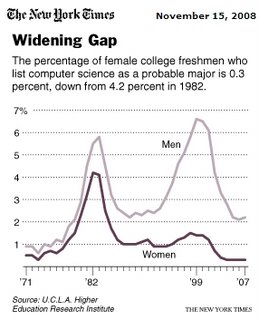 Women in other technical and engineering disciplines have increased, but not computer science. Why not? The article recaps theories including lack of computer games for women; "nerds" not being who girls want to be (hey, Willow on Buffy and Mac on Veronica Mars made girl nerds look just fine, if you ask me); and women going into interface design rather than programming - via other college programs rather than computer science. And a possible perception that there aren't jobs for women who major in computer science.
Women in other technical and engineering disciplines have increased, but not computer science. Why not? The article recaps theories including lack of computer games for women; "nerds" not being who girls want to be (hey, Willow on Buffy and Mac on Veronica Mars made girl nerds look just fine, if you ask me); and women going into interface design rather than programming - via other college programs rather than computer science. And a possible perception that there aren't jobs for women who major in computer science.
The Stanford Clayman Institute for Gender Research recently published the report "Climbing the Technical Ladder: Obstacles and Solutions for Mid-Level Women in Technology," based on study of Silicon Valley companies. The findings aren't unsurprising for any woman who's been working in computer companies for the last 10 years, even outside Silicon Valley. Some of the observations that rang true for me:
- "Women are more likely than men to perceive workplace culture as competitive. They do not see their workplaces as true meritocracies; rather, they see cultures that require connections to power and influence in order to advance."
- "Consistent with prevailing gender stereotypes about women’s abilities, women in management positions are perceived as less technically competent than are their male counterparts. This can create an environment where women are viewed (and can view themselves) as “not fitting in” with the company culture."
- "Survey results show that mid-level men and women strongly value teamwork. Further, men and women perceive that collaboration is key to success in technology. However, mid-level women see a sharp divide between cooperation and competition at their companies. Mid-level women describe this gap as being especially acute during the promotion-review process, where they find existing promotion and evaluation practices reward competition instead of collaboration."
- "Mid-level women are more likely than mid-level men to suffer poor health as a result of work demands."
- Family responsibilities remain a significant problem for women - staying late and flex-time are necessary and often difficult for women to arrange. Women are far less likely to have a partner at home who can manage the family life for them than men are. Men also perceive a "family penalty" in the competitive workplace.
And then there's the supposedly obvious, but rarely acted on: Provide a workplace that shows it values teamwork, rather than competition (most company performance evals and bonuses are handled competitively). Cultivate a workplace with flextime and reasonable hours. Have a diverse executive staff and board (not just a female VP of HR), to signal respect for diversity and also help change the culture from the top down.
At a lot of companies where I've worked, it was well-known at the mid- and sometimes ground level that executives didn't "get along," that there were power games and competitions rather than cooperation and teamwork at higher levels in the company; that long hours were an unspoken rule for success on impossibly demanding jobs.
Most of the time, I just think women are smarter in opting out of the whole tech management game. So why is there any mystery about lack of women in technical management? And in computer science departments?
4 comments :
wow. I'm actually surprised at that report. granted, most of the engineers/IT peeps where I work are guys.
Is it that those fields are just not as attractive to women, because of the connotations they already have? A soon as there's another geekgirl show that makes it appealing as other fields women are more prominent in, I think there will be more applying.
Hmmm, I wonder what the ratio is in India?
So true, Lynn. Thanks for the article!
this is the second place I have come across the notion that women are not faring well in IT. Anecdotal evidence from my nationwide wanderings as a contractor: it must be true. When I began years ago it was mostly guys like me and it still is.
nice....!
Post a Comment